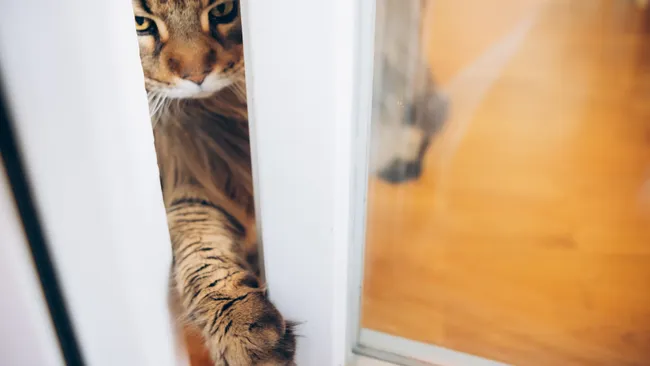Meowing, sticking their paw under the door or pawing at the door are just some of the strange things cats do around closed doors. But why?
If you’ve ever observed a cat facing a closed door, you might have noticed its noticeable frustration. Whether it’s a furry paw poking under the gap, incessant scratching, or agitated meowing, it’s clear that the closed door is a source of irritation. But what drives this intense reaction?
According to experts, both evolutionary instincts and our interactions with them contribute to this behavior.
Dr. Karen Sueda, a board-certified veterinary behaviorist, explains that part of the issue is rooted in the cat’s natural curiosity and what she terms “FOMO” — the fear of missing out. “Cats are innately curious and driven by a desire to explore unknown areas,” Sueda told Live Science. “A closed door prevents them from satisfying this curiosity, leading to their agitation.”
Cats are territorial by nature and like to monitor everything within their domain, which includes their human’s home. This behavior stems from their need for control, a trait inherited from their wild ancestors. “Cats need to manage access to their space and basic needs for their sense of security,” said Ingrid Johnson, a cat behavior consultant. “This isn’t about being mean; it’s about maintaining a balance between their predator and prey instincts to stay safe and secure.”
Jane Ehrlich, another cat behaviorist, identifies what she calls the “three terrible C’s” that a closed door embodies for cats: lack of choice, loss of control, and disruption of routine. While they might not want to be involved in whatever is happening behind the door, they definitely want to be aware of it.
Additionally, a closed door cuts off their access to attention from their owners. A 2017 study in Behavioural Processes found that most cats prefer human interaction over other stimuli like food or toys. Cats don’t understand the concept of a temporary barrier; they only perceive the loss of a previously accessible space that was associated with safety or comfort. “When we impose restrictions, we inadvertently stress our cats,” Johnson added.
To mitigate anxiety, it’s advisable for cat owners to be consistent with their cat’s access to different areas. For instance, if you want to keep your cat out of the dining room, it’s better to make it a permanent restriction rather than an occasional one.
However, if a cat’s response to a closed door escalates to frantic vocalizations, flattened ears, or hissing, it could indicate genuine distress. In such cases, Sueda recommends consulting a veterinarian to ensure there are no underlying health issues.
